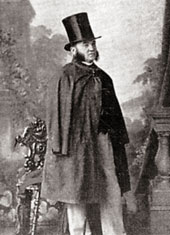Paul of Oubril
Paul von Oubril , also Paul d'Oubril , actually Pawel Petrowitsch Ubri , Russian Павел Петрович Убри (born November 4, 1818 , † February 6, 1896 in Naples ) was a Russian diplomat.
Life
Oubril came from an originally French Catholic family and was the son of the Russian diplomat Peter von Oubril . He entered the Russian diplomatic service and in 1848 became secretary of the embassy in Vienna. Here he was an employee of Alexander Michailowitsch Gorchakov and rose to the rank of first counselor. In 1853 he took part in the Vienna Conference, which unsuccessfully tried to prevent the Crimean War . After the end of the Crimean War, he was transferred to Paris . Here he met Otto von Bismarck in 1862 , who represented Prussia as envoy in Paris for half a year . According to contemporary accounts, both men initially developed a warm friendship with one another; later, according to Friedrich von Holstein , Bismarck is said to have been bitter about Oubril.

On January 24, 1863 Oubril was elected to succeed his brother Andreas Feodorowitsch Budberg-Bönninghausen as an ambassador of Russia at the Prussian court and for Mecklenburg-Schwerin and Mecklenburg-Strelitz accredited . After the formation of the North German Confederation , he also represented Russia there from February 12, 1868. On December 12, 1869, he represented the Tsar at a dinner in Berlin on the occasion of the award of the Grand Cross of the Order of St. George to the Prussian King Wilhelm I. Oubril's toast at this dinner, in which he emphasized: But you will also be there, and that rightly to see a new pledge of the ties that exist between the two sovereigns, the two peoples and the two armies, a pledge that would correspond to the interests of both countries and the interests of Europe , was seen in the public as a clear sign that Russia is itself would not oppose the power politics of Prussia. After the end of the Franco-German War that followed soon after and the proclamation of the German Empire , Oubril became the first Russian ambassador to the German Empire on December 30, 1871. On the occasion of the meeting of three emperors in September 1872, he and the Austrian ambassador Alajos Károlyi were jointly awarded the Order of the Black Eagle by Kaiser Wilhelm , which led to an outbreak of anger at Bismarck, who had not been consulted before (who only intended vases as a gift), and Hermann's resignation led by Thile . Oubril was one of the representatives of Russia at the Berlin Congress in 1878. However, as a result of the slap letter affair in the autumn of 1879, he lost his post and was recalled to Russia.
At the beginning of 1880 he received a new appointment as ambassador at the Kuk Hof in Vienna . From Vienna he conducted negotiations with Cardinal State Secretary Lodovico Jacobini to resolve differences between the Russian Empire and the Vatican. On October 31, 1880, he was able to conclude a preliminary contract for the appointment of Catholic bishops and training of seminarians in Russia. In 1882 he was recalled and appointed a member of the Russian State Council.
He died in Naples in 1896.
Awards
- Order of the Black Eagle (September 10, 1872)
literature
- [Waldemar von Bock] (published anonymously): Herr von Oubril's toast, illuminated by a Prussian: In addition to a postscript: concerning alleged negotiations between Berlin and Moscow. Hoffmann and Campe, Hamburg 1870
- Siegmund Hahn: Russian statesmen and diplomats of the present. Pp. 721-737, especially pp. 734f
Web links
- Certification and reception of foreign ambassadors at the North German Confederation. February 21, 1868 on Wikisource
- Treaty between Germany, Austria-Hungary, France, Great Britain, Italy, Russia and Turkey. (Berlin Treaty) on Wikisource
Individual evidence
- ↑ Hahn (Lit)., P. 735
- ↑ Friedrich von Holstein: The secret papers. Volume 1. Musterschmidt, Göttingen / Berlin / Frankfurt 1957, p. 123
- ↑ Quoted from Augsburger Abendzeitung No. 346 of December 17, 1869, p. 4489
- ^ Hermann von Petersdorff: Thile, Hermann von . In: Allgemeine Deutsche Biographie (ADB). Volume 54, Duncker & Humblot, Leipzig 1908, pp. 687-697.
| personal data | |
|---|---|
| SURNAME | Oubril, Paul from |
| ALTERNATIVE NAMES | D'Oubril, Paul; Ubri, Pavel Petrovich (real name) |
| BRIEF DESCRIPTION | Russian diplomat |
| DATE OF BIRTH | November 4, 1818 |
| DATE OF DEATH | February 6, 1896 |
| Place of death | Naples |
